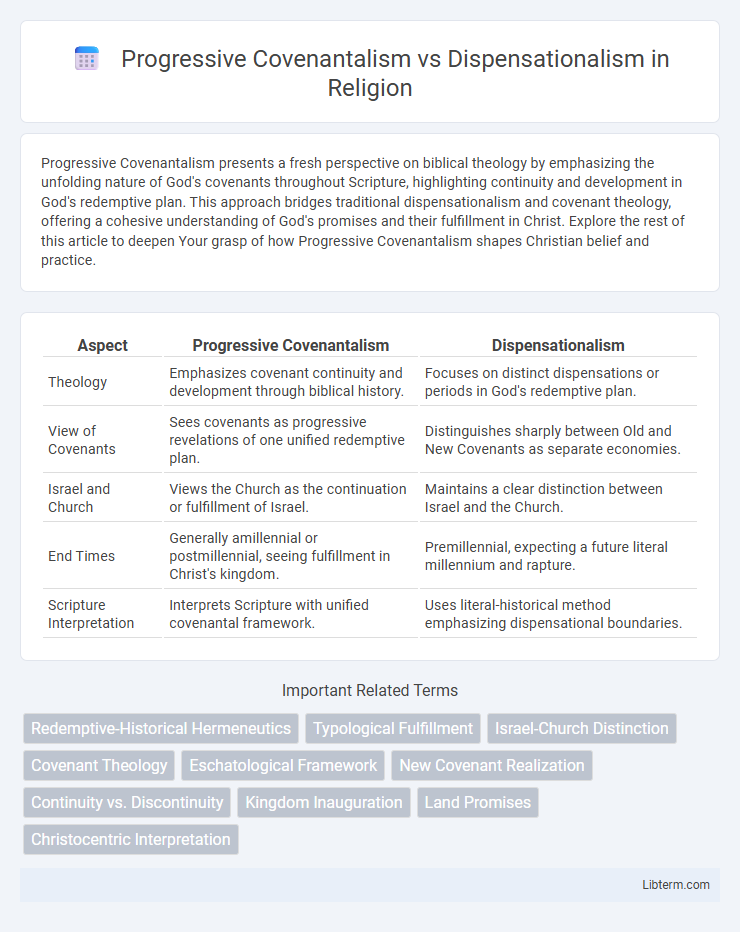Progressive Covenantalism presents a fresh perspective on biblical theology by emphasizing the unfolding nature of God's covenants throughout Scripture, highlighting continuity and development in God's redemptive plan. This approach bridges traditional dispensationalism and covenant theology, offering a cohesive understanding of God's promises and their fulfillment in Christ. Explore the rest of this article to deepen Your grasp of how Progressive Covenantalism shapes Christian belief and practice.
Table of Comparison
| Aspect | Progressive Covenantalism | Dispensationalism |
|---|---|---|
| Theology | Emphasizes covenant continuity and development through biblical history. | Focuses on distinct dispensations or periods in God's redemptive plan. |
| View of Covenants | Sees covenants as progressive revelations of one unified redemptive plan. | Distinguishes sharply between Old and New Covenants as separate economies. |
| Israel and Church | Views the Church as the continuation or fulfillment of Israel. | Maintains a clear distinction between Israel and the Church. |
| End Times | Generally amillennial or postmillennial, seeing fulfillment in Christ's kingdom. | Premillennial, expecting a future literal millennium and rapture. |
| Scripture Interpretation | Interprets Scripture with unified covenantal framework. | Uses literal-historical method emphasizing dispensational boundaries. |
Introduction to Progressive Covenantalism and Dispensationalism
Progressive Covenantalism interprets the Bible through a unified covenant framework, emphasizing the continuity of God's redemptive plan across both the Old and New Testaments. Dispensationalism divides biblical history into distinct periods or "dispensations," each characterized by different divine economies and expectations. Both theological systems offer contrasting views on how God's promises and revelations are structured throughout Scripture.
Defining Key Terms: Covenants and Dispensations
Covenants in Progressive Covenantalism refer to the unfolding, God-initiated agreements that define the relationship between God and humanity across biblical history, emphasizing continuity and fulfillment in Christ. Dispensations in Dispensationalism describe distinct periods in which God administers His will differently, highlighting a clear division in biblical history and often predicting a literal future fulfillment of promises. Understanding these terms is crucial for grasping how each theological framework interprets Scripture and God's redemptive plan.
Foundational Theological Assumptions
Progressive Covenantalism asserts a unified redemptive plan through successive covenants that progressively reveal God's kingdom, emphasizing continuity between the Old and New Testaments grounded in covenantal relationships. Dispensationalism, by contrast, distinguishes distinct historical economies or dispensations, each with unique divine administrations and often emphasizes a sharp division between Israel and the Church. Foundationally, Progressive Covenantalism prioritizes covenantal continuity and fulfillment in Christ, while Dispensationalism relies on discrete dispensations with separate purposes in God's unfolding plan.
Approaches to Biblical Interpretation
Progressive Covenantalism emphasizes God's unified redemptive plan through successive covenants, interpreting Scripture with a focus on the continuity and fulfillment of God's promises in Christ. Dispensationalism, by contrast, divides biblical history into distinct dispensations or administrations, often interpreting prophecy and covenants literally and viewing them as separate plans for Israel and the Church. These differing hermeneutical frameworks significantly influence theological conclusions regarding the kingdom of God, eschatology, and the relationship between the Old and New Testaments.
The Unity and Diversity of Scripture
Progressive Covenantalism emphasizes the organic unity of Scripture through a progressively unfolding covenantal plan that reveals God's redemptive purposes across both Old and New Testaments, highlighting thematic and theological coherence. Dispensationalism maintains a clearer distinction between prophetic eras and covenants, underscoring diversity in divine administration while often separating Israel and the Church as distinct entities. The unity in Progressive Covenantalism is marked by a covenantal framework that integrates diversity, whereas Dispensationalism preserves diversity by delineating distinct dispensations with unique divine purposes.
Israel and the Church: Comparative Perspectives
Progressive Covenantalism emphasizes the continuity of God's promises to Israel, viewing the Church as the fulfillment and continuation of Israel's covenantal identity, rather than a separate entity. Dispensationalism maintains a clear distinction between Israel and the Church, expecting a future restoration of Israel distinct from the Church's spiritual mission. This theological divergence impacts eschatological expectations and interpretive approaches to biblical covenants, prophecy, and the unfolding of redemptive history.
The Role of the Old Testament in Each System
Progressive Covenantalism views the Old Testament as a foundational covenantal framework that progressively reveals God's redemptive plan, emphasizing continuity and fulfillment in Christ. Dispensationalism treats the Old Testament as a distinct era with specific divine programs, highlighting a clear separation between Israel and the Church in God's plan. Both systems interpret Old Testament promises differently, impacting their understanding of biblical prophecy and covenantal relationships.
Fulfillment of Biblical Promises
Progressive Covenantalism emphasizes the continuity of God's promises fulfilled progressively through biblical covenants, culminating in the person and work of Christ as the ultimate fulfillment of Old Testament promises. Dispensationalism distinguishes between different dispensations or eras, asserting a future, literal fulfillment of many biblical promises specifically to Israel, separate from the church. Both frameworks interpret the fulfillment of biblical promises around Christ but diverge in the timing and recipients of those promises.
Eschatological Implications
Progressive Covenantalism and Dispensationalism present distinct eschatological frameworks, with Progressive Covenantalism emphasizing a unified, unfolding covenantal plan culminating in Christ's kingdom, rejecting rigid distinctions between Israel and the Church. Dispensationalism maintains a sharp division between Israel and the Church, forecasting a future literal fulfillment of Old Testament promises to Israel and a pretribulational rapture of the Church. These differences influence interpretations of key prophetic events, such as the millennium, tribulation, and the role of Jerusalem in end-times theology.
Practical Impact on Christian Life and Worship
Progressive Covenantalism emphasizes the continuity of God's redemptive covenant throughout Scripture, fostering a holistic approach to worship that integrates Old and New Testament themes, promoting unity and a deeper understanding of God's unfolding plan. Dispensationalism segments biblical history into distinct dispensations, encouraging believers to anticipate a future literal fulfillment of prophecy, which often shapes eschatological hope and worship focused on Christ's imminent return. These theological frameworks influence Christian practices, where Progressive Covenantalism encourages covenantal community and sacramental worship, while Dispensationalism often leads to heightened awareness of prophetic timelines and distinct roles for Israel and the Church.
Progressive Covenantalism Infographic

 libterm.com
libterm.com